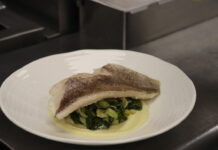The gate to Aunt Lola’s yard hung limp on broken hinges, closed with a piece of rope. Basilio let himself in from the alley and walked over cracked concrete to her backdoor. It was nearly dawn on Christmas Eve, stars fading into a gray, cloudy sky, a sea bag full of gifts on his shoulder.
He paused before knocking, staring in as Lola moved around the kitchen in her housecoat, sipping coffee. She didn’t hear him when he rapped lightly, so he watched a moment more.
Post-war metal cabinets thick with brown paint and wrinkled decals of horses; an old Oriole stove— a tank without a thermostat— next to a top-of-the-line Kenmore fridge, a mourning gift from Lola’s kids when their father passed away the year before. On the wall, next to a one-week-left-in-the-year calendar from Our Lady of Pompei, a studio portrait of the original Bombacci sisters— Mary, Stella, Anna, Francesca and Amelia— unsmiling in old country sepia before dispersal to orphanages, servants quarters and, inevitably, America.
During the Great Depression— when being poor meant nothing more than not having money— the sisters had populated the alley with children, a score or more of first cousins that included Basilio’s father, son of Francesca, and Lola, daughter of Anna.
Basilio and Lola, whom he called aunt out of respect, were the only ones left in the 600 block of S. Macon St. The rest were dead or scattered in a grass-is-greener hopscotch that began in an alley once known for homemade wine and rosebushes before it skipped to Dundalk and then Rosedale and White Marsh, and now out to the God-forsaken, subdivided pastures of Harford County. The family would be celebrating Christmas Eve out there— all except Lola and Basilio. Lola’s children had tried for a year to get her out of the house, to no avail. And Basilio, who made ends meet painting pictures of seafood on the sides of refrigerated trucks and didn’t own a car, sure wasn’t hiking out to Fallston just for dinner.
Lola came to the door and pulled the curtain, her face creased with lines he’d drawn a thousand times over, wisps of Francesca, gentle to the point of naiveté, alive on the other side of the glass. She squinted, recognized him and unlocked the door as he plucked something from his bag, the satchel immediately lighter by half.
“Hey, hon,” said Lola. “Whatchu doin’ up so early?”
“Giving out presents,” he said, stepping into the warmth of fresh coffee, dishwater and oil heat and holding a heavy, long-handled cookie iron in front of her. “This one had your name on it.”
In the long moment that Lola puzzled over the well-worn contraption, Basilio realized he hadn’t been a boy for a very long time. His daughter was grown and on her own; his parents had slowed to a ritual of soup and salad at 2 p.m. every afternoon no matter what day it was; and no one put out shallow, dime store dishes of celery dribbled with olive oil and black pepper before holiday meals anymore.
“What is it?”
“What is it?”
Lola felt around on top of the washing machine that stood between the door and the sink and found her eyeglasses.
“Good God,” she said. “I ain’t seen one of them in many a year.”
As she poured coffee for him, Basilio opened the flat jaws of the pizzelle iron to show what was engraved there: the Miraculous Medal of Our Blessed Mother on one side and a busy weave of diamonds on the other.
Miraculous: A floral “M” in a constellation of petitions, the initial interwoven with a cross surrounded by 12 stars.
Twelve stars: a dozen men on the road sowing truth no one wants to hear.
Truth: Spare parts and broken hearts in an East Baltimore kitchen nearly a hundred years after their ancestors had found warm beds, full plates and simple work in the shadow of a great bottle cap factory.
“Where’d you get it, kid?”
“Where do you get anything in the Third World nation of Baltimore?” said Basilio, laughing. “From some dummy who didn’t know what the hell it was.”
He set the iron across a newspaper on the table, yesterday’s headlines confirming his cynicism, and looked around the spotless rowhouse, Catholicism a lesser devotion than prayers said on your knees with a bucket and a scrub brush.
Aunt Lola didn’t have a tree, but carols were playing on a plastic AM radio and she’d taped Christmas cards to the spokes of the banister in the middle room.
“What the hell am I gonna do with a pizzelle iron? Hang it on the wall?”
And, just before Basilio could say that it wasn’t a bad idea— hang it on the wall, put up a small shelf and light candles— something better occurred to him.
“I don’t know, hon.”
“How hard can it be, Aunt Lol?”
“I turned many a pizzelle iron, but one of the cousins picked up on the recipe, not me.”
“No one wrote it down?”
“Didn’t have to,” she said. “So nobody did.”
“We can do it,” he said, drumming his fingers across the plastic tablecloth. “I watched ‘em do it, you did it every year. Eggs, sugar, flour and butter, like everything else.”
“Got plenty sugar,” she said. “But baking powder, baking soda— I don’t keep that stuff around no more.”
“The store does,” said Basilio, getting up to peek in the fridge, empty except for a small carton of milk, a big jug of water and two meatballs in a dish of tomato sauce. An expensive night light.
“There’s some vegetable oil in the cabinet,” she said. “But the main thing…”
“É is the anise,” said Basilio.
Lola moved to a roll-top hutch, Pennsylvania Dutch stenciling on the lacquered wood, and found a crusty brown medicine bottle, bone dry.
“Don’t let ‘em give you extract, it’s too weak,” she said, handing him the bottle. “Oil of anise. Same as what you’re holding.”
Lola went for her change purse but Basilio was already at the door. “Be right back,” he said, picking up his sea bag on the way out the front door. On the street, he counted the houses as he passed them, remembering who used to live in them.
Mr. Kugler, “the German” who made beer in his basement, put on lederhosen to hike in Patterson Park and was head chef at the bottle cap factory down by the railroad tracks when it employed a thousand people.
Miss Helen, a tough Polish lady who shucked oysters in cold packing houses on Boston Street, worked as hard as any man and would tell you without being asked, “We didn’t have no women’s lib in them days, we just worked …”
His grandparents’ house in the middle of the block, where, on a Christmas Eve 40 years earlier, he’d lost a flying Beatle doll— John— above these tarred roofs: a toy enjoyed for a moment before it disappeared into the cold night sky.
How he’d cried!
Never imagining that a couple of miles down the salty river would find him living on Macon Street the way his widowed grandfather had before him: alone.
Two blocks up, he hit Eastern Avenue and turned left toward the old Chessie underpass, built in 1930 when the factory was supplying millions upon millions of crimped, cork-lined “crowns” to bottlers around the world. A train rolled by as he walked beneath the trestle and he stopped to absorb the feel of it, remembering stories of Depression-era kids being sent to pick up loose coal to throw in pot-bellied stoves: cheap coal that burned dirty and every now and then blew up a house.
The train passed and he moved into the Highlandtown shopping district, reaching into his bag to give away a baseball cap— the mighty cartoon orange bird, freshly laundered and smiling— to a boy young enough to be happy about it; a repaired rosary to a Salvadoran woman pushing a stroller with two kids in it— he laid a little holiday Feliciano on her and she smiled— unloading everything he had in a short walk to DiPasquale’s near the corner of Gough and Conkling.
Sometimes during this annual ritual of passing out unwrapped oddities that people would have stepped over if they hadn’t been presented as gifts, he’d see the very thing he’d given away— a plastic action figure or a ball with a few bounces left in it, a redistribution of something more impossible than wealth— lying in the gutter alongside the spot where he’d offered it.
At DiPasquale’s, around the corner from the Zannino funeral home where his grandfather had lain, Basilio ordered a double espresso from the girl behind the deli counter and drank it down, his duffel no longer a St. Nick sack but a grocery bag as he grabbed what he needed. At the register, he took out the anise bottle and asked if they could refill it for him, the way Lola said they did back when you got anise at the pharmacy. Studying the bottle like an Indian arrowhead, the cashier chuckled and handed it back to him along with a clear, plastic bottle of anise, just as small and $5.95.
In Basilio’s wake, someone was buying ricotta and someone was getting hauled out to a hearse. On an opposite corner, Mr. Stan was selling last-minute inventory at his custom foam shop: pierced hearts and holly for the cemetery and twinkling lights for fake trees. One goes and the whole string goes out.
“Got it,” said Basilio, walking back in the house without knocking.
The kitchen table was covered with wax paper and an empty aluminum spaghetti pot sat on the counter. Aunt Lola was leaning up against the washing machine, counting on her fingers.
“I think I got it, too,” she said. “It’ll all come back when I start working the dough.”
She cracked a half-dozen eggs into the pot and tossed everything else in after them, pouring out a couple tablespoons of the anise oil, Basilio holding the pot steady as she leaned over it with an electric mixer, the beaters nicking the edges.
And then, she took a dab of the dough and fashioned a small cross from it, sticking the icon to the back of the stove where they’d see it as they worked.
“My mother always did that,” she said. “For luck, I guess.”
Basilio turned a knob on the stove and put a match to the front burner, the oven as old as the railroad underpass, bought at Bolewicki’s and in the house for years before Lola moved in on her wedding day. The iron lay over the open flame— “good and hot,” said Lola, “it’s gotta be good and hot”— and soon she was dropping small balls of dough between the scored jaws. The first few were pale prototypes, trial and error and an almost-good one for every three that weren’t right at all.
“Let me try,” said Lola, taking the iron and dipping under the weight of it. “My God, it’s heavy.”
Basilio held her wrists in his hands— they were soft and pudgy, like the dough— and helped her turn the iron. They made a keeper and flipped it onto the wax paper, the cookie flat and crisp and light brown around the edges, the “M” raised in perfect legibility.
Lola had been up since 3 and couldn’t get back to sleep. “I’m gonna rest my eyes a little bit,” she said, moving to the couch in the front room, a crocheted pillow under her head. “Just a couple minutes.”
A couple of minutes was all it took for Basilio to get the ambidextrous hang of making the cookies by himself, as though the iron and the dough were brushes in his hand: open, plop, squeeze long enough to say a “Hail Mary,” turn the iron, sing a verse of “God Only Knows,” open, pluck, repeat, repeat, repeat as Aunt Lola breathed in the warm aroma, the licorice scent of the anise perfuming her dreams.
Awake, we recognize and remember the mystery of more than 10,000 smells through a thousand genes and a thousand receptors. They come together the way letters form words and words make sentences. Asleep, the gift multiplies and the receptors that told Lola pizzelles were piling up in the kitchen had bonded in the shape of a teardrop.
Science promises that in the future, smell may be restored to those who’ve lost it; a day when appetite, fear and longing will be given back to people unable to follow their nose. Until that day … two dozen pizzelles on the table, three dozen, four.
As pictures moved in Lola’s gray head— glimpses of the trucking company at Foster and Oldham when it was a pasture, the day when her mother unwittingly burned up the rent money by hiding it from her husband in the oven— Basilio turned the iron and stared into the alley. Out there in the weeds and litter, he saw the days when he’d been taken into small, dark bedrooms crowded with heavy furniture and crucifixes large enough to plant on Calvary, vanity tables turned to altars for sick old ladies as the Bombacci sisters fell away, one by one.
He never remembered their names, could never tell the difference between Aunt This One and Aunt That One, the rooms smelling of death and Noxema as the aged brushed their hair below 3-D collages of the Sacred Heart, frames of bleeding butterfly wings that scared and transfixed a boy no taller than the post at the end of the bed.
“Come here, kid,” they’d say in broken English. “Let me look at you.”
For taking five small steps from the foot of the bed to the head with a little nudge from behind, for letting his cheek be touched, Basilio would get a quarter. Remembering what a long, hard road those steps had been, he decided that when Lola woke up, they’d retrace them together.
When Lola did wake up, she found the table crowded with cookies, the aluminum pot, rimmed with crusts of dried dough, soaking in the sink.
“Good Lord, how long was I sleeping?” she said, nibbling the edges of a pizzelle. “What are we gonna do with all these cookies?”
“Give ‘em away,” said Basilio.
“Sounds good to me,” she said. “I slept good.”
They packaged the cookies in tins Lola found in the basement, dusty things once packed with Goetze’s caramel creams,
Esskay sausage and Utz potato chips, old drums she rinsed out and layered with the last of the wax paper.
As Basilio passed her stacks of cookies, Lola counted them: four dozen, five dozen, six dozen, “seven dozen, just like I thought we’d get from what we whipped up,” she said, eating another cookie as Basilio picked up the phone and asked for a cab.
“Where we going?”
“Fallston.”
“Fallston!” said Lola, happy to take a ride. “Wait’ll they get a load of us! Should we call and let’em know we’re coming?”
“Nah.”
The cab honked and they walked out the front door, Lola with one tin, Basilio behind her with two more. His sea bag lay empty on the kitchen floor. The cold was sharp and the late afternoon sky was heavy with the possibility of snow.
“I dreamt the bottle cap factory was on fire,” she said as they got in the cab. “That cork burned for a week when we was kids. Didn’t think they’d ever put it out.”
“It’s gonna be new again,” said Basilio, telling the cabbie to ride by the factory on the way out. “Just like the old American Can building over in Canton.”
“Canton, sure, over in Canton. But not here.”
“I’m just saying, hold onto your house Aunt Lol. It’s going to be worth a lot of money.”
“Where the hell am I gonna go?” she said, a month away from her 75th birthday. “I’m going straight from here to Zannino’s.”
The cab turned for the interstate, then traveled over the river and through the woods with the pizzelles warming Lola’s lap through the bottom of the tin.




